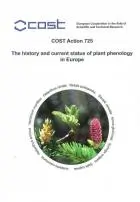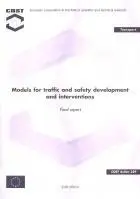
Leuven Proceedings - New Ligh Alloys Part A

Schlussbericht der untergruppe "radiosonden"

Elektronische hilfen für den verkehr auf grossen fernverkehnrsstrassen

Unconventional Medicine in Europe - Basic Research Papers - Literature review

Second European Conference on Policy Related to Telematics and Disability

The History and Current Status of Plant Phenology in Europe
- Pages: 182
- Author(s): J. Nekovar
- Publisher(s): Vammalan Kirjapaino Oy
- ISBN/ISSN: 978-951-40-2091-9
This book gives and excellent insight into the national and international European phenological networks with contributions from 30 European countries and from the International Phenological Gardens.

Models for Traffic and Safety Development and Interventions: Final Report
- Pages: 235 pages
- Publisher(s): EU Publications Office (OPOCE)
- ISBN/ISSN: 978-92-894-6378-2
- EUR: 20913
The explosive development of European road transport after WW II brought great benefits, but incurred a substantial toll in terms of deaths and injuries caused by accidents. A number of safety actions focused on stopping or slowing down this negative development were implemented. In the 1980s, a need for deeper analysis was recognised. The understanding of safety developments benefits from comparison between various countries. This pre-supposes a common methodological framework and database, consisting of the necessary data for each country in the same format.
The COST 329 Action compared various national approaches, evaluated them and specified an efficient methodology forthe analysis of past and future traffic safety developments. The tools developed help politicians and administrators to assess safety trends, to compare safety scenarios and to select the most effective measures in order to improve safety programmes.

Improvements of Buildings' Structural Quality by New Technologies - Outcome of the Cooperative Activities: Final Report
- Pages: 661 pages
- Author(s): J.P. Jaspart
- Publisher(s): EU Publications
- ISBN/ISSN: 415366100 | 4-153-661-00
- EUR: 21431
COST Action C12 was launched in May 2000. About 100 scientists from 21 of the 35 COST member countries contributed to COST Action C12. The main objectives of COST Action C12 – and relevant to the urban civil engineering domain of COST – were: to develop, combine and disseminate new technical engineering technologies; to improve the quality of urban buildings; to propose new technical solutions to architects and planners; to reduce the disturbances of the construction process in urban areas, and finally to improve the quality of living in the urban habitat.

Heritage, Weathering and Conservation - Volume 1
- Pages: 527 pages
- Author(s): R. Fort, M. Alvarez De Buergo, M. Gomez-Heras, C. Vasquez-Calvo
- Publisher(s): Taylor & Francis
- ISBN/ISSN: 415412722
Proceedings of the “International Conference on Heritage, Weathering and Conservation, which took place in Madrid, Spain on 21-24 June 2006.
